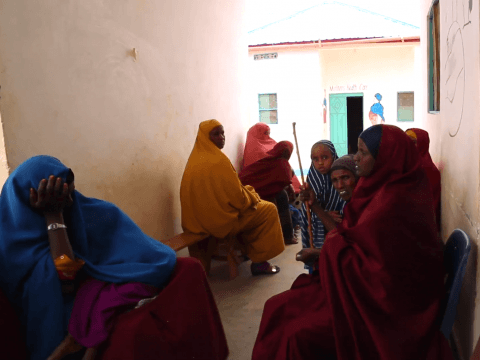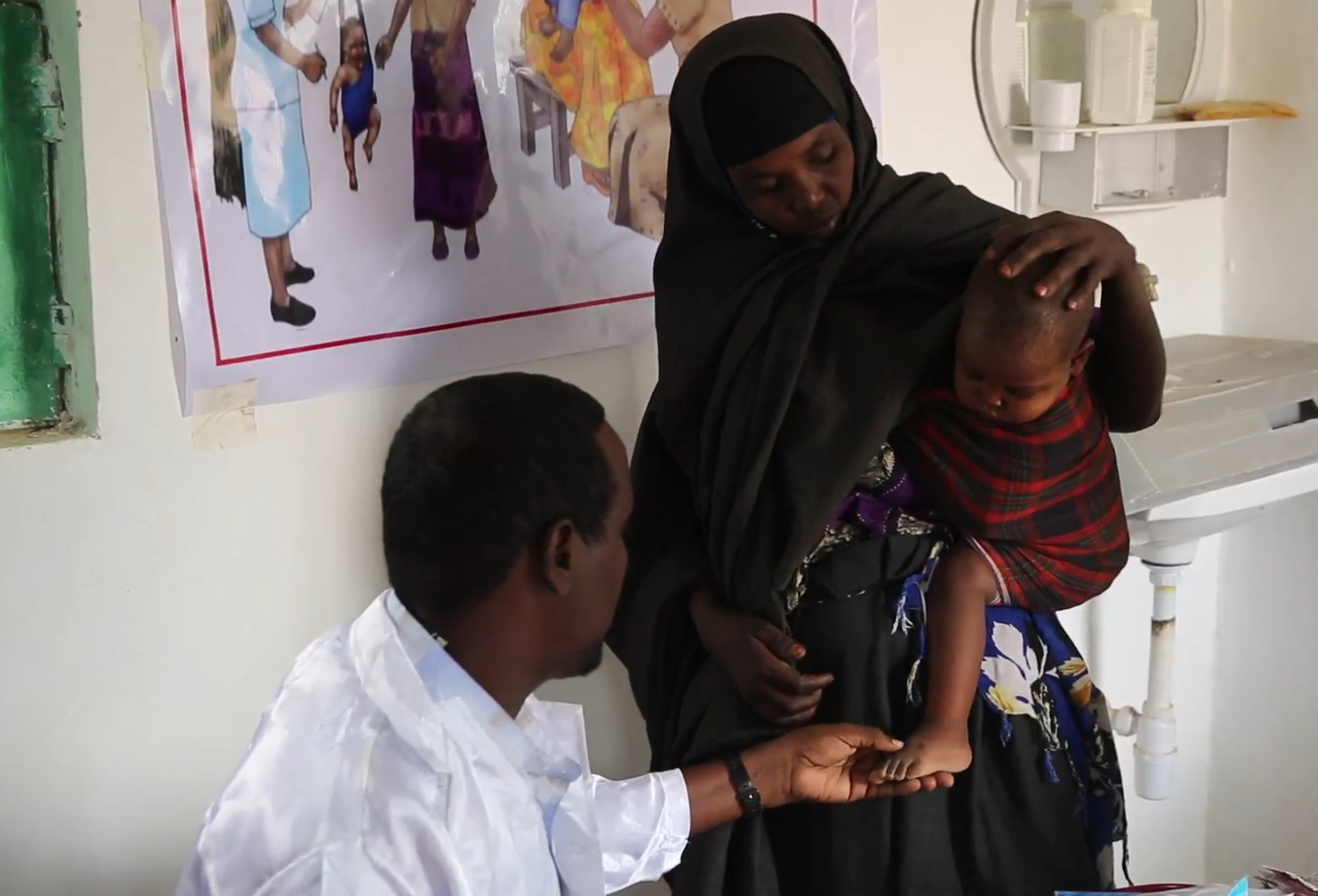Re-merging Health care system in South West State

Since 2014, World Vision has been partnering with local NGOs in South West State (SWS) and the community to make it possible for vulnerable women and children to access health care services. With support from OFDA and Global Affairs Canada, World Vision began health interventions by way of mobile clinics establishing seven mobile clinics that served 28 IDP camps on a weekly basis. Through continued funding, World Vision has been able to transition these mobile clinics to support static facilities like Isha, Towfiq, Darusakam and Bayhaw MCH (Maternal Child Health) and various health posts within the IDP camps to be able to enhance regular health care services.
Bringing together communities and government units to re-establish a functional health sector is one of the new approaches that World Vision is engaging in. World Vision piloted this work to realize sustainable health care provision under the supervision and guidance of the state owned institutions.
In 2015, World Vision with the support from the Government of Canada, partnered with the South West State’s Ministry of Health to provide basic health care services in Darusaalam community. The intervention mainly seeks to promote utilization and access to primary health care services with maternal and child health care being the main focus.
For the partnership to be successful, World Vision was involved in series of dialogue between the Ministry of Health SWS and the Darusaalam community facility level management committee. World Vision provided the Ministry of Health with technical expertise and guidance helping to co-create a transparent recruitment system, adopting a rigorous testing mechanism for health facility recruits. Finally World Vision helped to broker an agreement between Ministry of Health and the local community concerning facility management, contract terms and promoted establishment of a joint performance management system, ensuring that newly recruited health facility staff would be answerable to local community management, committees and accountable to technical standards required by the Ministry.
Since its establishment, Darusaalam MCH has been very pivotal to the community. Initially people would walk for long distances to access health services, where they would queue for a very long time before being attended to.
“Most of the mothers would queue for very long hours and wait till evening to get medication. Most of them would have left their homes without taking any food,” says Isaack Hassan Hussein, the chairman of the Dhanwadag initiative task force.
A child being attended to at Daruusalam MCH
The quality of the health staff employed at the MCH was drawn from surrounding towns and most having previous experiences working with NGOs.
“The services here at the MCH are good,” adds Isaack, “the staff have a good attitude towards the patients and they are also professional at what they do.”
When the MCH was constructed, there was no wall. The community felt that items from the health facility like medical supplies would need to be secured. Through the Dhanwadag (togetherness) community initiative, the community organised themselves to begin construction of the wall for the newly constructed facility, to date the perimeter wall fencing has been completed and a gate installed.
“Through the Dhanwadag initiative, we worked together with the community and we were able to build a fence for the hospital as this is our hospital,” remarks Isaack.
The wall that was built by the community members
Mariam Mohamed, a midwife at the MCH agrees with the initiative. “The Danish Demining Group built the MCH through the Dhanwadag initiative, the community further on their own helped in the construction of the fence. This is how we interact here,” she affirms.
Dhanwadag is a community-focused initiative where the community contributes toward a cause. This initiative in Baidoa has contributed to community infrastructural developments like construction of roads, schools as well as health initiatives. This brings about ownership of the project.
The MCH health intervention seeks to promote utilization and access to primary health care services with the main focus on maternal and child health care. The MCH seeks to provide Reproductive health care including skilled delivery services. A significant proportion of the women population is unable to utilize skilled midwifery care due to limitation with access. This continues to raise the maternal mortality and morbidity rate. Through such maternal health care interventions, World Visions strives to contribute to a reduction in maternal mortality rates.
“I want to thank God, that we have this kind of services. Before the MCH was constructed, we would carry pregnant women to a health facility that was far away. We encountered many problems but now we have an MCH at our doorstep,” notes Mariam Mohamed, a midwife at Darusalaam MCH
Other initiatives geared towards mitigating maternal and mortality rates include enhancing support for focused antenatal and postnatal care including referral provision for obstetric complications and distribution of clean delivery kits for rural based pregnant women who may not be able to make it to the MCH. To date a total of 8,000 pregnant women have benefited from the range of Reproductive health care services provided at Darusalam MCH.
“The health services are beneficial to us. Now when mothers deliver they will get a delivery health kit that comprises of baby items like blankets and sweaters. There are also some complicated issues that we cannot manage and so we refer these cases to other health facilities and World Vision caters for their transportation,” states Mariam.
The health intervention in the South West State has immensely benefited the community. So for a total of 140,542 beneficiaries have been reached. Through improved and consistent access to health care services, the intervention has reached 21,032 pregnant women with 33, 701 children below one year benefiting through the vaccination initiatives. A total of 85,809 beneficiaries have benefited through outpatient medical consultation and treatment services with 3, 422 children benefiting through outpatient nutrition treatment of severe acute malnutrition.
Despite the great strides that have been made by World Vision, Ministry of Health and the community, gaps still exist especially among rural population who live on the outskirts of Baidoa and the neighboring districts, they continue to suffer consequently due to limited access to essential health care.
“On many occasion you find that the women are compelled to endure long distances to the health facility in Baidoa,” affirms Florence Obura, World Vision’s Health and Nutrition Technical specialist, South and Central Somalia. “Continued support would be needed to sustain the interventions and scale up the maternal and child health care initiatives and of course support to the South West State Ministry of Health to be able to establish a robust yet sustainable health care system within the state,” she concludes.
“This is the best health facility that we have here. The medical services you miss here, you will not find in Baidoa. There are some medicines that you can easily get in the market but the drugs here you cannot see them in the market. I believe there is no best MCH than this,” declares Isaack.

